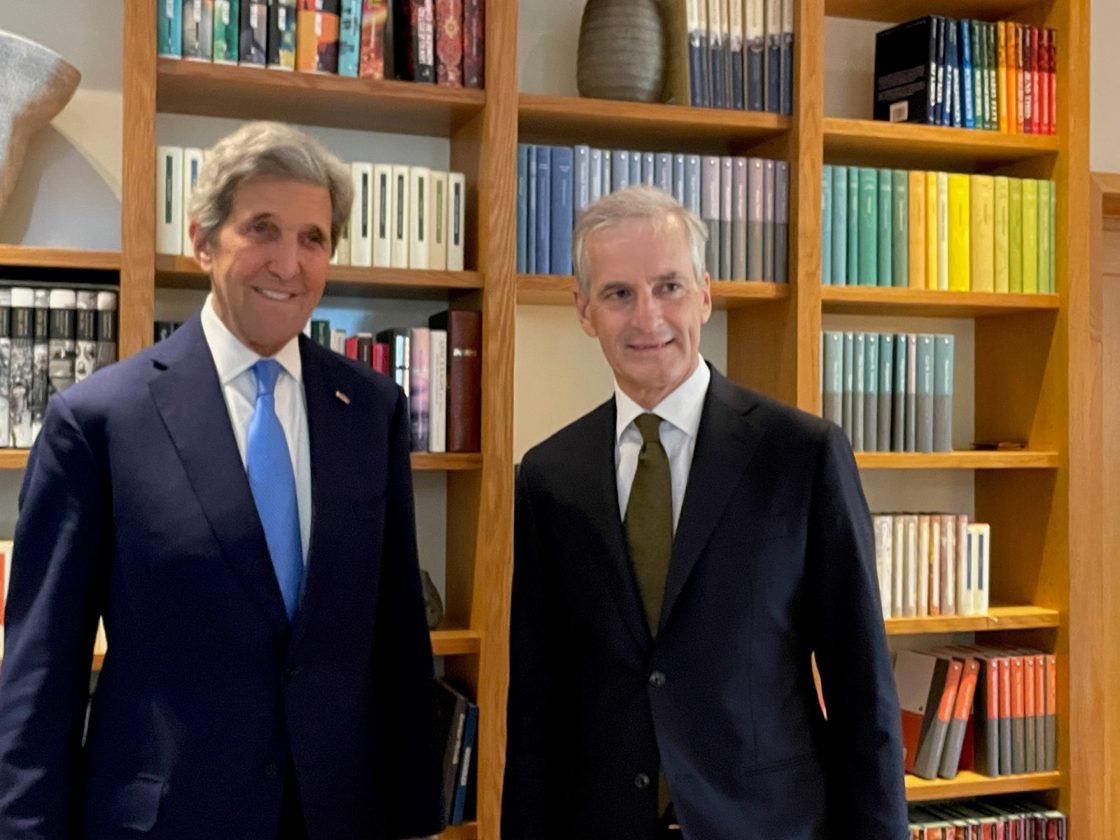Joint statement on climate
Nyhet | Dato: 06.05.2022 | Statsministerens kontor, Ministry of Climate and Environment, Ministry of Trade, Industry and Fisheries, Ministry of Foreign Affairs
The text of the following readout was released by the Governments of the United States of America and Norway on the occasion of Special Presidential Envoy for Climate John Kerry’s visit to Oslo, Norway.

Today in Oslo, U.S. Special Presidential Envoy John Kerry met with Norwegian Prime Minister Jonas Gahr Støre, Minister of Foreign Affairs Anniken Huitfeldt, Minister of International Development Anne Beate Tvinnereim, Minister of Climate and Environment Espen Barth Eide, and Minister of Trade and Industry Jan Christian Vestre to discuss a wide range of climate-related issues. After the meetings, Secretary Kerry and Prime Minister Støre released the following statement:
The United States and Norway remain close partners in addressing the climate crisis, including by working together to promote the energy transition in key emerging economies, to reduce global forest loss, to promote implementation of the Global Methane Pledge, including by reducing flaring and leakage from the global oil and gas sector, and to advance food security through the reduction of food/fertilizer waste and increased sustainable production of aquatic food. We will work toward a successful UN Climate Conference in Egypt (COP 27) that promotes continuity and accountability through focusing on implementation of existing commitments and initiatives, as well as enhancing ambition and advancing new initiatives. The United States is pleased that Norway endorses the First Movers Coalition, which aligns investment and demand signals to scale up transformative near-zero emissions technologies in multiple sectors of the economy. Norway will become an FMC Government partner to help further elevate the role of Norwegian companies in the initiative, as well as to contribute to its continued growth and success.
We will deepen our long-standing collaboration on supporting tropical forest countries in their efforts to halt and reverse deforestation. Building on the Glasgow Leaders Declaration on Forests and Land Use we will elevate forests in global and bilateral diplomatic efforts. Through the LEAF Coalition and other initiatives we will mobilise large-scale investments to tropical forest countries and jurisdictions that successfully reduce forest emissions. Together, we will promote a shift in commodity and financial markets to advance deforestation-free commodity production, and enable the private sector to eliminate deforestation from supply chains and portfolios. To this end, Norway has announced it will join the United States and leading companies in the Forest Data Partnership, which will enhance the traceability of commodities and supply chain transparency. We will work with agricultural commodity producing countries to support a transition to inclusive, resilient deforestation-free production. And we will work with Indigenous Peoples to advance their rights pertaining to their lands and resources, and with local communities to advance their efforts to manage their lands for the future.
We welcome the successful outcome of the 7th Our Ocean Conference, which was co-hosted by the United States and Palau and followed the 6th Conference in Oslo. It catalyzed over 400 commitments valued at over $16 billion, including announcements on ocean-based actions, including offshore wind energy, that further the goal of keeping global warming below 1.5 degrees Celsius. The United States is pleased to have joined Norway as a member of the Ocean Panel, which continues to make key contributions to sustainable ocean management, understanding the impact of greenhouse gas emissions on the ocean, and advancing ocean-based climate action. As we look ahead, we will work together to make further progress at the UN Ocean conference, to advance the goal of zero emissions from the international shipping sector no later than 2050 at the International Maritime Organization, to launch a "green shipping challenge" at COP 27 to further ocean-based climate actions such as green shipping corridors and the production of zero-emission lifecycle fuels, and to advance offshore renewable energy deployment.